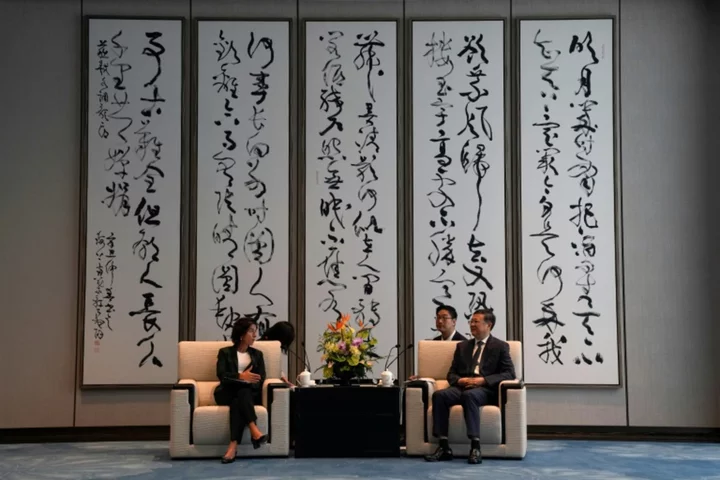Business in China could become "too risky" for US firms without changes to the regulatory environment, Commerce Secretary Gina Raimondo warned Wednesday as she wrapped up a visit to the world's second-largest economy.
Speaking on her fourth day in China and after several rounds of talks with officials as well as with US firms, Raimondo said she had raised "tough issues" with local counterparts.
The business environment in China "has to be predictable, there has to be a level playing field, there has to be due process, there has to be transparency", she told a press conference near Shanghai.
"US business needs to see some action taken to address these issues, otherwise they will deem it as too risky," she said.
Raimondo's is the latest in a series of visits by senior US officials to Beijing, as both sides seek to defuse tensions across a range of security and economic issues that have been at their highest levels in years.
"I raised the tough issues like subsidies, like China's non-market practices, like raids on US firms, like intellectual property theft," Raimondo said.
But this week's talks were "productive", she added, and an "excellent start".
"Nothing good comes from shutting down communication," she said.
US firms in China have long complained about what they see as an unfair business environment, with limited protection for intellectual property and preferential treatment afforded to domestic competitors.
Those fears have been compounded this year by a broad crackdown on US consulting firms operating in China.
A new anti-espionage law, which came into force on July 1, has also spooked foreign and domestic firms as they try to decipher authorities' intentions and, crucially, pinpoint what is off-limits.
- 'Most consequential' -
Raimondo has used the trip to seek more open discussions with the Chinese over restrictive trade curbs and the two sides have agreed to set up a working group to iron out the laundry list of trade disputes between them.
She has also repeatedly said that US curbs on Chinese businesses -- which Washington says are aimed at protecting its national security -- need not affect the broader economic relationship.
Chinese officials have pushed back, with Premier Li Qiang telling Raimondo Tuesday that US moves to "politicise" trade issues would prove "disastrous" for the global economy.
"Politicizing economic and trade issues and overstretching the concept of security will... seriously affect bilateral relations and mutual trust," Li told Raimondo, according to China's official Xinhua news agency.
On Wednesday, Raimondo told Shanghai Communist Party chief Chen Jining that the US-China economic relationship was "among the most consequential in the world".
Later, she met with students at New York University's campus in Shanghai and spoke at a meeting of women executives hosted by the American Chamber of Commerce in the city.
The American Chamber of Commerce in China's president told AFP the organisation backed Raimondo's comments calling for changes in Chinese policy.
"We've been very clear in our meetings with the Chinese government that while some US companies are prospering, certain actions, including raids on companies and restricting data flows, are not conducive to attracting additional FDI (foreign direct investment)," said Michael Hart.
bur-oho-pfc/aha









